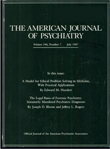12-Month Outcome of Patients With Bipolar Disorder Following Hospitalization for a Manic or Mixed Episode
Abstract
OBJECTIVE: The authors studied the 12-month course of illness following hospitalization for a manic or mixed episode of bipolar disorder to identify potential outcome predictors. METHOD: They recruited 134 patients with DSM-III-R bipolar disorder who were consecutively admitted for the treatment of a manic or mixed episode. Diagnostic, symptomatic, and functional evaluations were obtained at the index hospitalization. Patients were reevaluated at 2, 6, and 12 months after discharge to assess syndromic, symptomatic, and functional outcome. Factors associated with outcome were identified by using multivariate analyses. RESULTS: During the 12-month follow-up period, there were no significant differences in outcome between patients with manic compared with mixed bipolar disorder. Although syndromic recovery occurred in 48% of the overall group, symptomatic recovery occurred in only 26% and functional recovery in only 24%. Predictors of syndromic recovery included shorter duration of illness and full treatment compliance. Medication treatment compliance was inversely associated with the presence of comorbid substance use disorders. Symptomatic and functional recovery occurred more rapidly and in a greater percentage of patients from higher social classes. CONCLUSIONS: A minority of patients with bipolar disorder achieved a favorable outcome in the year following hospitalization for a manic or mixed episode. Shorter duration of illness, higher social class, and treatment compliance were associated with higher rates of recovery and more rapid recovery.



